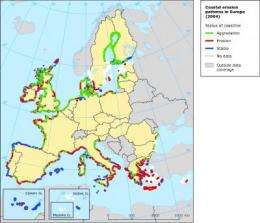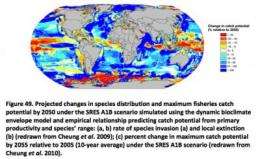Major threats foreseen due to Europe's changing marine environments

Europeans face greater risk of illness, property damage and job losses because of the impacts of climate change on the seas around them.
Worried citizens, whose biggest related top-of-mind concerns are sea level rise and coastal erosion, are taking personal actions to reduce carbon emissions. However, they largely blame climate change on other groups of people or nations and assign governments and industry responsibility for mitigating the problem (though they perceive government and industry as ineffective on the issue).
Those are among the conclusions after scientists synthesized an extensive collection of academic papers published since 1998 on climate change and Europe's marine environments, combined with a groundbreaking companion poll of Europeans on the issues, commissioned as part of Project CLAMER, a collaboration of 17 European marine institutes.
The 200-page synthesis of more than 100 EU-funded projects, the public survey, a new book based on the scientific findings, and a major new documentary film will be featured at CLAMER's wrap-up meeting Sept. 14-15 in Brussels.
The research distillation captures a suite of documented and forecast physical, chemical and biological marine changes with far-reaching consequences, including sea-level rise, coastal erosion, melting ice, storm frequency and intensity, physical changes including the North Atlantic circulation system, chemical changes such as acidification and deoxygenation, changes in marine life patterns, and the ultimate impacts of all this on humans - both social and economic.
"We have amassed convincing and disturbing scientific evidence," says CLAMER co-ordinator Carlo Heip, Director of the Royal Netherlands Institute for Sea Research. "We need to communicate it much better than we have. We must all heed the clear warnings of the hazards we face from what amounts to an uncontrolled experiment on the marine environment."
Co-ordinated by the Marine Board of the European Science Foundation, with contributions from more than 20 scientists, the CLAMER synthesis and related book, both available to the public Sept. 13 at www.clamer.eu, examine the environments of the North Sea, Baltic Sea, Arctic Ocean, North-East Atlantic Ocean, Mediterranean Sea and the Black Sea.

The synthesis notes that it is difficult to predict precisely the impacts of climate change or attach cost estimates to them. As well, some impacts will be widespread while others will vary from place to place.
That said, the societal impacts forecast include:
Rising illness risk
Says the CLAMER synthesis: "Millions of euros in health costs may result from human consumption of contaminated seafood, ingestion of water-borne pathogens, and, to a lesser degree, through direct occupational or recreational exposure to marine diseases. Climatic conditions are playing an increasingly important role in the transmission of these diseases."
More specifically, a team of researchers from Italy, the UK, Germany and the USA recently found, for example, that warmer ocean water is causing a proliferation of bacteria from a genus known as Vibrio, among the most dangerous of all bacterial pathogens, which can produce serious gastroenteritis, septicemia and cholera.
Some types of the bacteria and micro-algae are linked to shellfish-associated food poisoning deaths. Others harm marine animals, including mollusks and fish, "with major economic and environmental impacts," the researchers say.
Published in July in the Journal of the International Society for Microbial Ecology, the paper reports "an unprecedented increase in the number of bathing infections that have been associated with warm-water Vibrio species in Northwest Europe," and a "globally-increasing trend in their associated diseases."
While the study was based on seawater samples taken near the mouth of Europe's Rhine River and Britain's Humber River, "the increasing dominance of marine Vibrios, including pathogenic bacterial species, may very likely occur in other areas around the world."
Says the paper: "We provide evidence that Vibrios, including the (cholera) species, increased in dominance within the plankton-associated bacterial community of the North Sea during the past 44 years and that this increase is correlated significantly with climate induced sea surface warming during the same period. ... Ocean warming is favouring the spread of Vibrios."
Property damage
Sea level rise, combined with higher waves being recorded in the North Atlantic and more frequent and severe storms, threaten up to 1 trillion Euros worth of Europe's physical assets within 500 m of the shore. And some 35% of Europe's GDP is generated within 50 km, the synthesis notes.
"Sea-level rise of 80 to 200 cm could wipe out entire countries ... causing sea floods, massive economic damage, large movements of populations from inundated areas, salinity intrusion and loss of wetlands including the ecosystem services that they provide."
More frequent and intense storms, meanwhile, are projected for Northern Europe, especially in a band running from the south of England through northern France, Denmark, northern Germany and Eastern Europe. Annual damages are expected to rise 21% in the UK, 37% in Germany and 44% across Europe as a whole, with a 104% rise in losses from 1-in-100 year storms.
Smaller fisheries and northward fish migrations
The CLAMER synthesis suggests the need for Europe's commercial fishery to reduce catches in places and make adjustments in others due to warming water, ocean acidification, and altered salinity and oxygen content.
"Some of the biggest [changes] will be required in Europe's seas, where temperatures are rising faster than the open North Atlantic," according to one research paper in the CLAMER collection.
Another warns of possible extinction of cod stocks in the Baltic Sea and calls for "a strategy ... to ensure the persistence of Baltic cod into the twenty-second century."
In the Mediterranean Sea, the catch of Aristeus antennatus (www.eol.org/pages/347714), a valuable shrimp, may experience "a true collapse" as changes in sea temperatures dramatically reduce, or even stop, the transfer of nutrients to deep waters.
Ominously, the biggest reductions in fish populations are forecast for low-latitude regions, many of which are already impoverished and face the greatest loss of agricultural production due to increased drought and storms. Researchers say the northern migration of some fish species poses a serious food security threat for poorer tropical countries where fish often constitute the largest source of protein.
The global pattern will apply to Europe, with the southern fisheries generally losing productivity while those in the north such as Greenland, Iceland and Norway are expected to gain.
With respect to the northward shift of fish species, the CLAMER synthesis notes one of the largest ever observed: the dramatic spread of the snake pipefish (Entelurus aequoreus - www.eol.org/pages/223062). Prior to 2003, the fish was confined to the south and west of the British Isles. It now extends as far north as the Barents Sea and Spitzbergen, about 3,000 km to the north.
European attitudes toward climate change and the marine environment
The online survey of 10,000 residents of 10 European countries -- 1,000 from each of Spain, Italy, Germany, France, Czech Republic, Netherlands, Ireland, United Kingdom, Norway and Estonia -- reveals widespread concern about climate change, led by worries about sea level rise and coastal erosion.
Conducted in January by Brussels-based TNS Opinion, the survey, available to the public Sept. 13 at www.clamer.eu,is the first of its kind to focus on public perceptions of climate change impacts at the coast or in the sea. The poll findings are further explained by in-depth research, carried out by UEA, that involved UK public participants in group discussions.
Provided by Flanders Marine Institute (VLIZ)